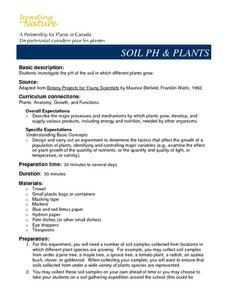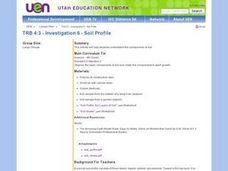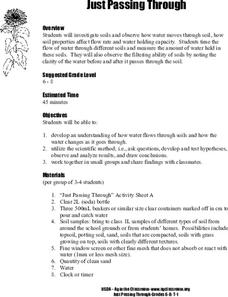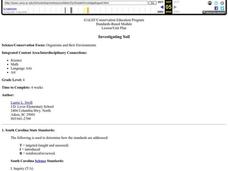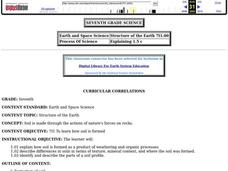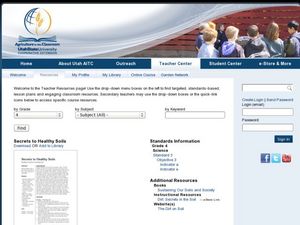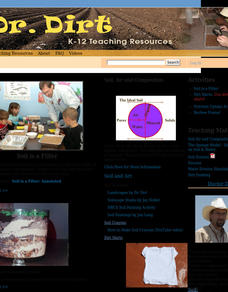Curated OER
How Can You Test Your Soil?
Students investigate chemicals in soil samples. In this soil science lesson, students test local soil to measure the pH, nitrate, phosphate, and potassium content.
Curated OER
Observing and Questioning
Third graders investigate different types of soil. In this soil lesson, 3rd graders compare various soil samples. They work hands-on with their peers to find the differences and similarities.
Curated OER
Investigating Animals in Soil
Students investigate and observe small animal activity on a plot of land on their school grounds. In small groups they identify the five kingdoms of animals, stake out a small plot of ground, collect samples, record and analyze any data...
Curated OER
SCRUMPTIOUS SOIL
Students engage in investigations that lead to the discovery that earth materials consist of rocks, soils, water, and air. They build models of soil profiles, using breakfast cereal and other edible materials. They observe how water...
Curated OER
Science in the Garden
Students examine soil from their local environment. In this garden lesson, students recognize the importance of soil in the garden. Students explore the contents of the local soil.
Curated OER
Soil pH & Plants
Students investigate the pH of the soil in which different plants grow. They design and carry out an experiment to determine the factors that affect the growth of a population of plants, identifying and controlling major variables...
Curated OER
Investigation 6 - Soil Profile
Fourth graders study the components of soil. They observe the basic components of soil and relate the components to plant growth. They record color, texture, and kinds of materials on their profile log (light color, denser, grittier -...
Curated OER
Glacial Striation Investigation
Students operate a GPS unit to investigate the direction of glacier movement. They describe the motion of glacier movement by interpreting a graph. Students explain how scientists use glacier striations to determine glacier movement.
Curated OER
Just Passing Through
Students explore how water moves through soil. They experiment with different soil types and record their findings.
Curated OER
WET Science Lesson #3: Comparison of Aquatic and Terrestrial Plants
Elementary life science explorers compare and contrast aquatic and terrestrial plants (elodea and soybeans) in a Venn diagram. Some background information is provided to support direct instruction, and general instructions are provided...
Curated OER
Investigating Soil
Fourth graders swap local soil samples with another school and examine the differences. They research soil properties, identify organisms that live in soil, create and maintain a biome of soil decomposition and design a poster to present...
Curated OER
Soil Formation
Seventh graders investigate how soil is formed. They analyze types of soil samples, examine soil using a magnifying glass or microscope, complete a chart, conduct a soil and plant experiment, and construct a soil profile.
Curated OER
Secrets to Healthy Soil
Fourth graders explore needed mineral nutrients for healthy soil. In this soil lesson, 4th graders investigate how living and nonliving elements combine to contribute to fertile soil development.
Curated OER
Investigation 7 - Plants In Soil
Fourth graders explain how the components of soil effect plant growth. They brainstorm different kinds of materials that plants could use for structural support. They design an experiment to show that plants can grow without soil.
Curated OER
What is in Soil?
Fourth graders identify and examine the components that make up soil. Individually, they use a magnifying glass to identify the organic and inorganic material in their soil sample. To end the lesson, they record the differences in the...
Curated OER
Keeping Soil in Its Place
Fourth graders investigate erosion. In this Science instructional activity, 4th graders explore the role of weathering and plant growth related to erosion. Students define the components of soil. Students explore the history of the Dust...
Curated OER
Soil Isn't a Dirty Word
Students investigate the properties of rocks. In this geology lesson plan, students draw their profile and discuss what a soil profile would look like. Additionally, students demonstrate how to make soil by rubbing two pieces of...
Curated OER
What is the Composition of Soil?
Students examine the different components that make up soil. Using data, they identify the components of soil in their local area and discover how scientists use the soil to see how it was formed. They also describe the soil forming...
Curated OER
Demonstration of Factors Affecting Soil Temperature
Students examine the influences of water and mulch on soil temperature. In this investigative activity students complete a soil experiment.
Curated OER
Soil and Agriculture:Lesson 3 - Soil Erosion
Middle schoolers reseach the different types of soil erosion and ways to control it in this series of activities.
Curated OER
Soil and Water
Students study soil and how particle and pore size affect water movement. In this soil lesson students complete a lab activity to investigate pore saturation and sponge like behavior.
Curated OER
Who Done It?
Pick and choose which activities to include in this crime scene investigation. Junior detectives can examine fingerprints, DNA, blood samples, or bone structure. The plan suggests you have teams solve a mystery, but it does not give you...
Curated OER
Isopod Behavior, of the Rolly Polly Lab
Young scholars investigate the behavior of isopods. In this isopod lesson plan, students make observations of an isopod and sketch the pillbug. They study the orientation of the isopods in relation to moisture in a chamber they construct...
Curated OER
Acids, Bases, and Indicators
Chemistry or physical science fledglings get comfortable identifying acids and bases with a variety of pH indicators. They discover that different indicator solutions have different ranges, practice testing soil acidity, and use antacids...







